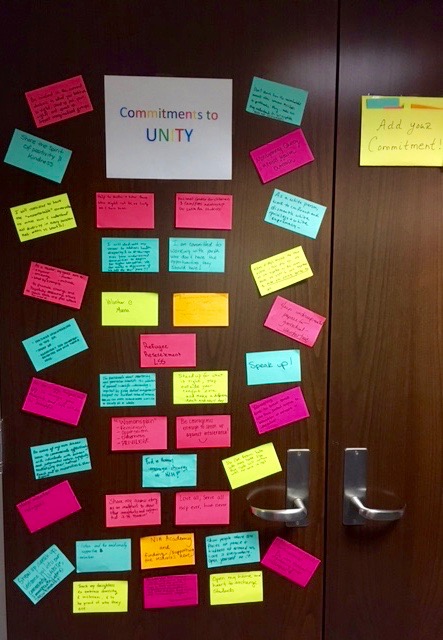Blog written by Michael J. Sheridan, MSW, PhD, Special Advisor for Diversity and Wellness Programs, Michael.sheridan@nih.gov
In a time when it seems that every news report is another example of discord and polarization, it can be difficult to determine how any one of us can make a difference. We can find ourselves thinking, “How can I make any real impact toward advancing social justice in healthcare, education, research and the larger society? I’m just one person with very little influence.” But as my OITE colleague, Dr. Darryl Murray observed, progress in the arena of equality and social justice is lot like science – each small step forward contributes to a bigger picture and an eventual solution. Without those seemingly “small” contributions, no progress is ever made.
Last Wednesday, the OITE hosted an NIH Trainee Unity event to help people consider what small, but important, steps they could take in building more welcoming and inclusive communities – at NIH and beyond. While munching on chips and salsa and bolstered by chocolate,* about 50 people shared their concerns and hopes for creating a more just and compassionate society. We were challenged by Dr. Sharon Milgram, OITE Director to identify, “What can you do to support unity?” Individuals wrote their commitments on brightly colored sticky notes, which are now posted in the OITE West hallway (Building 2, 2nd floor). Come by and see them and add your own!


- I will continue to have “uncomfortable” conversations to make sure I understand all diversity in every variation that makes us beautiful.
- Show up, speak up. Welcome people into our community (LGBTQ+, Immigrants, Latinx). Show empathy.
- Open my home and heart to exchange students.
- Volunteer in clinics for the uninsured; be more involved in mentoring junior colleagues
- Teach my daughters to embrace diversity & inclusion, & to be proud of who they are.
- I will dedicate my career to address health disparity & to encourage kids from underserved communities to aspire for higher education. We can make a difference if we all do our part!
- As a white person, work to confront and dismantle white privilege and white supremacy.
- Millions of people enjoyed the same eclipse a few days ago. We all live together on the same earth. We ought to work together to make our society better for all.




